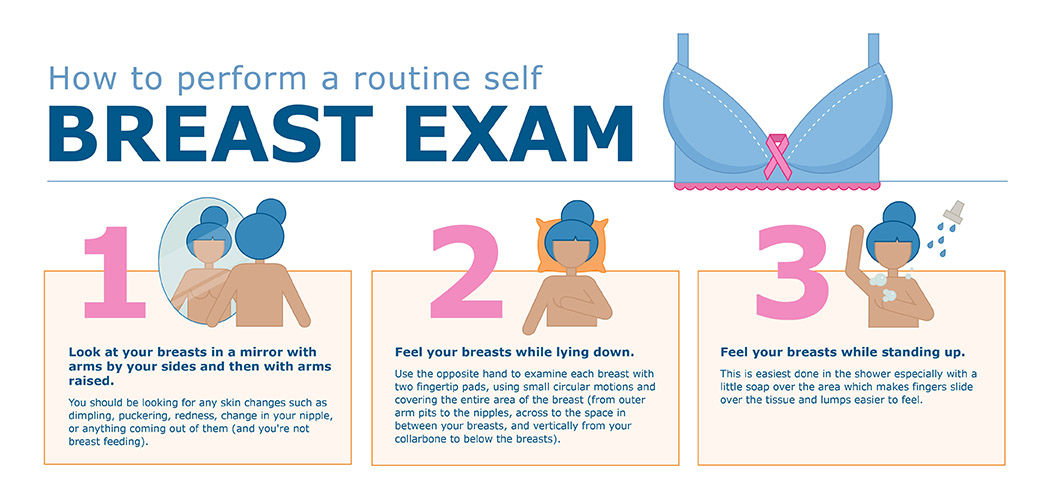Calling all the ladies! Are you doing what you need to ensure optimal health? Here are some important screening tests you should be getting done based on your age group:
1. Well Woman Visits
Having a yearly Well Woman visit is the best way to start off your feminine health journey. Our Physician Assistant Nazema Gosla has over 15 years of experience in family medicine and does her very best to ensure your comfort during these important and sensitive aspects of your health. She can inform you of what tests are appropriate for your age and medical history.

Nazema enjoys women’s wellness and applies a holistic approach to chronic disease management.
2. The Breast Self-Exam
It’s important to be familiar with your own breasts in order to understand what is normal so that when something changes, you can report it to your doctor. Adult women of all ages are encouraged to perform breast self-exams at least once a month. For women still menstruating, a breast self-exam should be performed a few days after her period ends. For those who are postmenopausal, a breast self-exam should be performed on the same day of each month, such as the 1st or 15th day of the month. Alert your healthcare professional if you notice any changes in your breasts, such as a new lump, sore spot, changes in the appearance of the skin, or nipple discharge.

3. STI Screenings
If you’re sexually active, especially with multiple partners, it’s important to be screened for sexually transmitted infections (STIs) regularly because you may be a carrier of an infection without having symptoms. It’s not uncommon for chlamydia to go undetected, leading to infertility in women. National guidelines recommend yearly screening for sexually active women under age 25 and women older than 25 and at increased risk of STIs — such as having sex with a new partner or multiple partners (USPSTF, Sept. 2021). Don’t assume that you’re receiving STI testing every time you have a pelvic exam or Pap test. If you think that you need STI testing, talk to your health care provider.
4. Pap Smear and HPV Testing
Pap Smears and HPV testing are important screeners for anyone with a cervix aged 21-65, every 3 years (USPSTF, 2022). A Pap smear looks for abnormal cells that can lead to cancer in the cervix. An HPV test looks for the human papillomavirus, a virus that can cause cervical cancer. Even if you have gotten the HPV vaccine, it is recommended that you get screened for cervical cancer. For a patient at the doctor’s office, an HPV test and a Pap test are done the same way—by collecting a sample of cervical cells with a brush.
5. Mammograms
Mammograms are x-rays of your breast that allow doctors to look for early signs of breast cancer. Regular mammograms can find breast cancer early, sometimes up to three years before it can be felt. Mammograms are recommended every 2 years for women aged 50 to 74 years old that are at average risk for breast cancer (USPSTF, 2016). Women who are 40 to 49 years old with a family history of breast cancer should talk to their health care provider about possibly getting tested before age 50. Here’s a tip: Try not to have your mammogram the week before you get your period or during your period. Your breasts may be tender or swollen then.
6. Colorectal Cancer Screening
Colonoscopy is used to detect colorectal cancer, traditionally in those aged 50-75 years. New guidelines from the American College of Gastroenterology recommend that screening begin as early as age 45 for all average risk adults (Shaukat, 2021). During the test, the gastroenterologist can find and remove most polyps that could potentially lead to cancer. For people that don’t have an increased risk of colon cancer, the U.S. Preventative Services Task Force recommends colonoscopy every 10 years or a stool test every year (USPSTF, May 2021). A family history of colorectal cancer may change the recommended start time and intervals for screening. Ask your doctor to find out what’s right for you.
7. Bone Density Screening
Bone Density Screenings, also called DEXA, are imaging studies used to determine if an individual has osteoporosis. It is estimated that one half of all post-menopausal women will have an osteoporosis-related fracture during their lifetime. It is recommended that women over the age of 65 have a bone density screening to see if they are at risk (USPSTF, 2018).
We hope that you use this information to guide you as you make important choices about your health. Feel free to call our office or schedule an appointment to discuss these preventative care tests with your provider.
References:
(2016, Jan. 11). Breast Cancer: Screening. U.S. Preventative Services Task Force. https://uspreventiveservicestaskforce.org/uspstf/recommendation/breast-cancer-screening
(2022, Mar. 10). Cervical Cancer: Screening. U.S. Preventative Services Task Force. https://uspreventiveservicestaskforce.org/uspstf/draft-update-summary/cervical-cancer-screening-adults-adolescents
(2021, Sept. 14). Chlamydia and Gonorrhea: Screening. U.S. Preventative Services Task Force. https://uspreventiveservicestaskforce.org/uspstf/recommendation/chlamydia-and-gonorrhea-screening
(2021, May 18). Colorectal Cancer: Screening. U.S. Preventative Services Task Force. https://uspreventiveservicestaskforce.org/uspstf/recommendation/colorectal-cancer-screening#bootstrap-panel–6
(2018 June 26). Osteoporosis to Prevent Fractures: Screening. U.S. Preventative Services Task Force. https://uspreventiveservicestaskforce.org/uspstf/recommendation/osteoporosis-screening
Shaukat, A., Kahi, C., Burke, C., Rabeneck, L., Sauer, B., Rex, D. (2021). Clinical Guidelines: Colorectal Cancer Screening. The American Journal of Gastroenterology. DOI: 10.14309/ajg.0000000000001122




